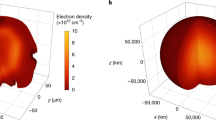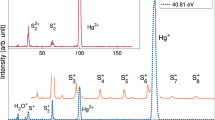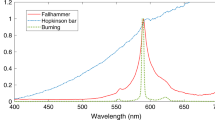Abstract
THE rate of recombination of chlorine atoms has been investigated using a flow system. The atoms were produced in a microwave discharge, and the atom decay followed by means of a movable thermocouple probe at which recombination occurred. The reaction tube of 4-cm internal diameter was poisoned with boric oxide. Runs using chlorine only, and chlorine/argon mixtures, were carried out. Linear flow speeds in the range 30–250 cm/sec, and total pressures (measured with a sloping oil manometer) of 0.24–3 mm mercury were used.
This is a preview of subscription content, access via your institution
Access options
Subscribe to this journal
Receive 51 print issues and online access
$199.00 per year
only $3.90 per issue
Buy this article
- Purchase on Springer Link
- Instant access to full article PDF
Prices may be subject to local taxes which are calculated during checkout
Similar content being viewed by others
References
Ogryzlo, E. A., Canad. J. Chem., 39, 2556 (1961).
Andrussov, L., Z. Elektrochemie, 54, 566 (1950).
Author information
Authors and Affiliations
Rights and permissions
About this article
Cite this article
LINNETT, J., BOOTH, M. Recombination of Chlorine Atoms. Nature 199, 1181–1182 (1963). https://doi.org/10.1038/1991181a0
Issue Date:
DOI: https://doi.org/10.1038/1991181a0
This article is cited by
-
On the kinetics of the chlorination of titanium dioxide in the presence of solid carbon
Metallurgical Transactions B (1980)
-
Recombination of Chlorine Atoms
Nature (1964)
-
Recombinations of Chlorine Atoms
Nature (1964)
Comments
By submitting a comment you agree to abide by our Terms and Community Guidelines. If you find something abusive or that does not comply with our terms or guidelines please flag it as inappropriate.



